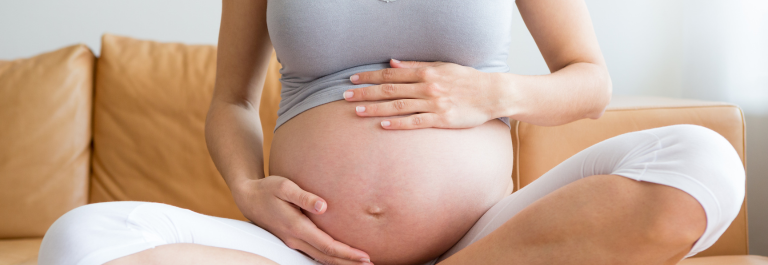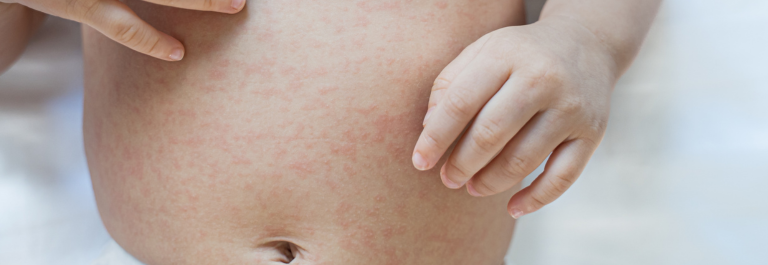While pregnancy is an exciting time, it can also come with several uncomfortable and irritating symptoms. Pruritic urticarial papules and plaques of pregnancy (PUPPP) - also known as polymorphic eruption of pregnancy (PEP) - is one such unappealing side effect. If you are experiencing PUPPP rash, it is natural to have questions about how to look after yourself and your baby safely.
In this article, we will discuss:
-
Causes of pruritic urticarial papules and plaques of pregnancy (PUPPP) rash
-
Symptoms of PUPPP rash
-
PUPPP rash home remedies and treatment
Read on to learn more about how to identify PUPPP rash, and what to do if you're affected by this skin condition.
What is PUPPP rash?
Polymorphic eruption of pregnancy, also known as PUPPP, is an immune response of the skin characterized by an abdominal rash that occurs in women of childbearing age, usually appearing in their first pregnancy. It is the most common skin condition in pregnancy, affecting as many as 1 in 150 pregnancies. While it is completely harmless to both you and your baby, it can cause intense itching and discomfort.
Women usually experience PUPPP rash during their third trimester or less frequently during the postpartum period, especially on areas affected by stretch marks. It generally does not appear in subsequent pregnancies; if it does recur, it tends to be milder.
Symptoms of PUPPP Rash
PUPPP rash tends to look similar to hive-like bumps or hive-like lesions. Here are some symptoms that are common when affected by this skin condition:
-
Itching that begins on the abdomen and develops into itchy bumps
-
Skin rash consists of itchy raised patches or bumps that are on or near stretch marks but do not affect the area surrounding the belly button
-
Rash spreads to other parts of the trunk - under breasts and towards the lower abdomen area
-
On lighter skin, the rash tends to be pink or red
-
On darker skin, the rash might be skin colored or a darker shade
-
Skin lesions may impact the quality of daily life activities such as sleep
What Causes PUPPP Rash?
It is still unknown precisely what causes pruritic urticarial papules and plaques of pregnancy, but it is thought to be related to the stretching of the skin because it occurs in late pregnancy when the skin is expanding to accommodate the fetus' rapid growth rate. This is also the time when stretch marks appear more frequently.
Pregnant people who meet the following criteria are thought to be at increased risk:
-
Experiencing their first pregnancy
-
Pregnant with a male fetus
-
Carrying multiples (it is more common with triplet pregnancies than twin pregnancies)
-
Caucasian
Natural PUPPP Rash Treatment
PUPPP generally goes away just before delivery or in the days and weeks after your delivery date. The main focus of treatment for PUPPP is to reduce itching and discomfort. If you're experiencing polymorphic eruption of pregnancy, it's understandable that you want to use treatments that are both gentle on your own body and safe for your unborn baby. Natural products are a fantastic way to look after yourself and your baby; luckily, some products work well to soothe this common rash.
Skin Care for PUPPP Rash
Using a natural moisturizer, like the Organic Manuka Skin Soothing Cream, can go a long way to relieve and soothe the itchy rash that comes from polymorphic eruption of pregnancy. Made of just six natural ingredients like Manuka honey, olive oil, and beeswax, it's safe for you and your growing baby. Its soft, buttery texture is designed especially to soothe sensitive, irritated, and itchy skin and can be used from head to toe. Try dry-wrapping the cream with a skin-soothing fabric like TENCEL for even more effective relief.
Clothing for PUPPP Rash
If you're experiencing interrupted sleep during pregnancy due to PUPPP, you're not alone. Many expecting mothers find that the itchy rash can cause discomfort that prevents them from falling or staying asleep. Wearing anti-itch clothing to sleep can help relieve these symptoms, giving you the precious rest you need. The Remedywear™ Long Sleeve Shirt and Remedywear™ Pants are made of silky soft TENCEL weaved with zinc oxide, providing soothing, anti-itch relief to the skin rash caused by PUPPP.
Other Treatments
For more natural ways of treating PUPPP rashes, try the following on the affected areas:
-
Aloe vera gel
-
Cold compresses
-
Cool baths
-
Oatmeal baths
-
Cotton clothes
For some pregnant people, PUPPS rash may need a short course of oral steroids or oral antihistamines. If the above natural treatments are not relieving your symptoms, it may be worth speaking to your physician or dermatologist. Having PUPPP rash diagnosed by a medical professional can ensure you get the best care for you and your baby.
Soothe Your Symptoms of PUPPP Rashes
Pregnancy is a special time of life in which self-care is of utmost importance for you and your baby. Try these tips to reduce your symptoms of polymorphic eruption of pregnancy and find soothing relief today!










